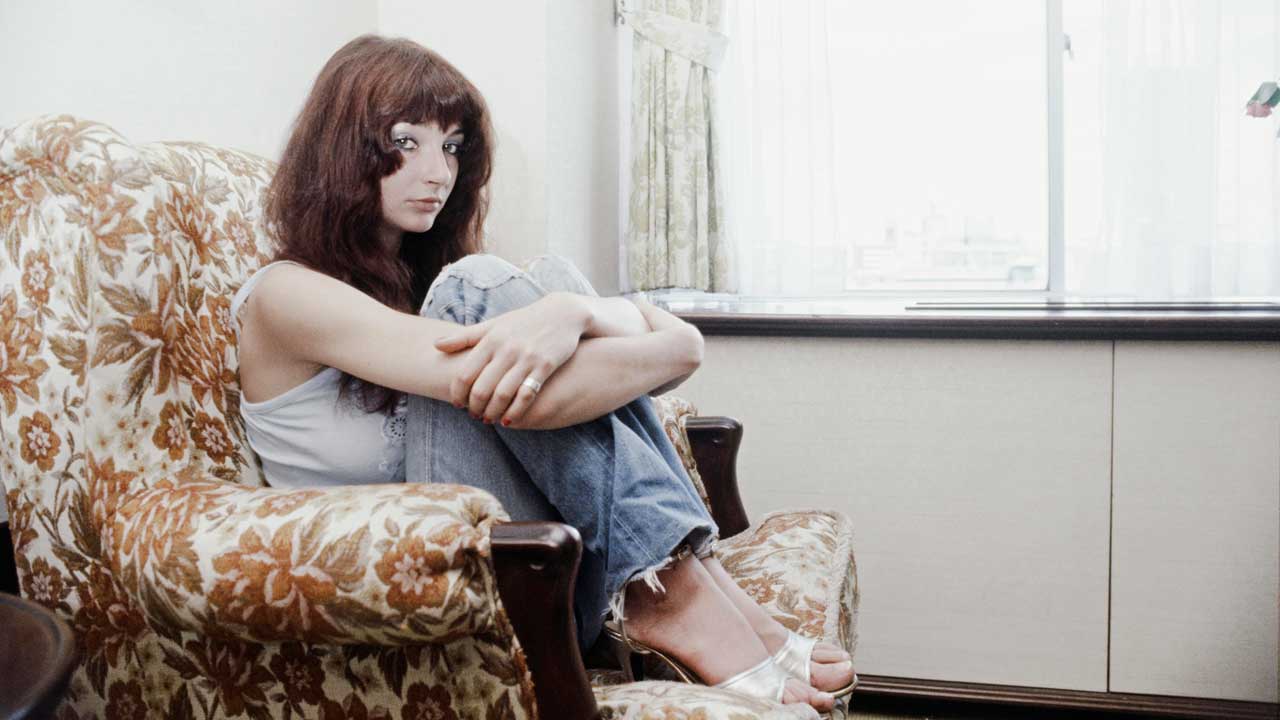"She was quite, quite breathtakingly beautiful. Her face a constellation of feline expression, ancient hieroglyphic image, a saucerful of secrets. The woman, accompanied by her honour guard of tiny laughing folk, moved elegantly up the footpath from the church doors, past where I was standing agape, and forward into the dark velvet forest that trimmed the hills to the North. She was singing... And it moved me in a way no other singing voice could; it was a delicious, indulgent moment of unspoilt pleasure, a caress that tickled me behind the ears and laid one finger on my groin. My heart was an open wound which would never heal."
So began a 1984 Kerrang! magazine profile of Kate Bush, wherein the writer decided that the English singer/songwriter would be best introduced to British metal fans via a 400+ words description of the dream he had about her, prior to interviewing her. Completely normal behaviour, or, at least, what passed for completely normal behaviour at the time.
Kate Bush doesn't give very many interviews these days. And reading through some of the articles that have been written about her, you can easily understand why. Back in the late '70s and early '80s, the gentlemen of the English music press, would get very, very worked up in the presence of the gifted south-east London-born musician, and the topic of Bush's perceived status as a 'sex symbol', or whether or not she was being promoted by her label as a 'sex object', was an all-too-frequent obsession.
'Sexy Kate Sings Like An Angel' was the headline in the Evening News as the 19-year-old singer's debut single Wuthering Heights entered the UK Top 20 in February 1978.
"I'm convinced she is the most important girl singer to have emerged in Britain for at least ten years," writer John Blake declared. "She's beautiful too and very sexy - all huge brown eyes and long, tangled auburn hair."
"But I'm not going to fall into the trap of doing the whole female thing, being a sex object," Bush told Blake. "I think a lot of woman are conditioned to want to look like that when they are young. But it's so dangerous to come on all sexual because straightaway you are label as a woman instead of an artist."
This, it seems, didn't stop music journalists such as Blake from telling their readers just how "charmed" they found themselves in Bush's presence.
"She is, indeed a beautiful woman," the readers of Sounds were informed in March 1978. "Carved ivory, with nary a nick. So obviously there is no way she can avoid becoming the target for sexist minds. Although she does not advocate this reaction, she's not flustered by it. After all, it is a compliment."
In many instances, you didn't even need to read more than the feature headlines to know how the profiles that followed were going to read in 1978. 'Bush Is A Sex Kitten' one declared. 'The Blossoming Ms. Bush' was the title of another. "When you clear your head of the fact that she is beautiful and young, her incredible singing and songwriting on her debut album The Kick Inside can engulf you and take you on a musical journey," gushed a journalist from the Sunday Express in an article titled, 'She's HOW old?'
You get the idea.
In an audio interview hosted on the excellent music journalism archive website Rock's Backpages, listed as taking place in 1978, but more likely conducted in 1979, given that it references Bush's 1979 single Wow, music writer Ian Ravendale says to Bush, 'I almost hate to ask you this, because it's like the standard question, but do you feel that you've been promoted to an extent as a sex object?'
"This is what everyone says, and it's not a matter of me being promoted as a sex object; it's a matter of really how I project myself," the ever-polite Bush replies. "And people would say that anyway whether I was clad in a nun's costume or nothing at all. And as long as I'm appreciated as a musician, that's ok."
The writer follows up by saying, 'Because sex does play a part in some of your songs', and then asks, 'Is your current single Wow about an orgasm?'
"About an orgasm?" a clearly surprised Bush responds. "Well it could be, I suppose but that certainly isn't worth talking about."
The writer chuckles to himself before Bush states that the single "is about showbusiness, really."
In 1981, after Bush topped the 'Female Sex Symbol' category in the Record Mirror Readers' Poll, the singer was asked directly by writer Chas de Whalley about her feelings on the matter, noting 'Kate sounded a little confused by it all'.
"Well, it's gratifying, I suppose," the singer replied. "But it makes me laugh really. What's it mean, being a sex symbol? It means people find me attractive, doesn't it? It's a gesture of affection I suppose and of course I'm very grateful. But I don't really think of myself like that."
For the UK's male music writers of the era, however, what Kate Bush actually thought wasn't of huge importance compared to their own projections about Kate Bush.

